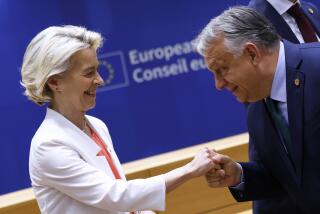Hungarian Communists Grapple Over Future Role for Party Amid Drive for Reform
- Share via
BUDAPEST, Hungary — Bitterly divided Hungarian Communists opened a watershed meeting here Friday, arguing over strategy that might allow them to elude, or at least postpone, what many of them worry may be their inevitable fate in Hungary’s political future--irrelevance.
Faced with the prospect next spring of the first free parliamentary elections in more than 40 years, the ruling Hungarian Socialist Workers’ Party, as the Communists formally call themselves, is split between a vociferous reform wing and party centrists, who are trying hard to hold the fractious party together at least long enough to stage a unified last stand.
The reformers, led by the ambitious Minister of State Imre Pozsgay, who already is planning his presidential campaign, advocate a radical reshaping of the Hungarian economic and political system, privatizing state-run industries as quickly as possible, opening the country to foreign investment and virtually eliminating the role of the party in the affairs of the economy.
Pozsgay and his followers have threatened to bolt the party if it refuses to go along with their program.
The centrists (real conservatives are regarded as one of the party’s “radical” fringe elements) prefer a more cautious approach that might let them hold onto their significant power and influence as political kingpins in the regions of the country outside the capital.
Unprecedented Problems
The party’s political problems are unprecedented. And recent experience, in Poland and in four mid-term by-elections in Hungary, where Communists lost by overwhelming margins to non-Communist candidates, does not offer much promise for the party loyalists.
“Deck chairs on the Titanic,” was the way one diplomatic observer characterized the proceedings, reflecting the widespread view that the Communists are doomed, no matter what rhetorical spin they adopt in their official platform.
Although the relative strength of the two sides has not yet come to the final test, the conservatives, reflecting their superior hinterland numbers, gained the upper hand in early skirmishes over procedural matters Friday. They won on votes on when and how to hold elections for the party presidency and to give the party president power to appoint his own slate of candidates for the new “electoral college,” the new name for the party’s Central Committee.
Although these issues seemed esoteric in the extreme, in the context of the party session they were dramatic points to the 1,500 delegates, who saw the decisions as an important assertion of old-line party authority.
At the same time, advocates of reform were greeted with sustained applause, especially Pozsgay, who called for a “new party which has to distinguish itself from its predecessor and has to live up to its draft program.”
This new party, Pozsgay said, would be a “Hungarian Socialist Party,” (dropping the antique-sounding workers from its name) that would “find its center not from within its own ranks” but from the “interests of the nation.” The new Hungarian Socialist Party, he said, “would do away with old bureaucracies.”
The party’s leading centrist figures appeared to score points with the delegates with veiled attacks on Pozsgay’s urgent approach to party reform. Karoly Grosz, who shares the party Presidium with Pozsgay and two other party figures, suggested it is possible for the party to go too far.
“People want to go as far as possible along the road (of reform),” he said, “in order to ensure that there is no turning back. The question is, whether we are willing to pay too high a price if we go too far.”
As usual in a meeting of Communist party officials in Eastern Europe, the Hungarian party delegates were unable to avoid frequent references to party history--an “assessment of past mistakes,” and the “need for a deep discussion of previous policies.” But there was also a new pressure for the party to look forward and to forgo, as much as possible, the party’s usual tendency to public soul-searching as a justification for a change in direction.
“It is depressing,” Grosz said, “to hear only of the mistakes of the party.”
In answer to a series of speeches by reform advocates, he pointed out that the party’s Central Committee, in the 16 months since he ousted the late Janos Kadar as party leader, had taken up more reform measures than the party’s bosses had dared in 15 years.
The Big Question
“The question is,” he continued, “how do we go on?’ This is the problem we have to deal with. . . . It does not make sense to emphasize this over-dramatized conflict (within the party).”
The remarks by Grosz drew loud applause, but so did a fiery speech by Attica Agh, a leading reformer, who decared that “Our party is in a desperate situation. It cannot operate as a state party any longer, and it cannot yet be a competitive political party. The old party is not yet dead, and the new party is not yet born.” Those who “resist pluralism,” he concluded, “must be expunged from the party.”
More to Read
Sign up for Essential California
The most important California stories and recommendations in your inbox every morning.
You may occasionally receive promotional content from the Los Angeles Times.













